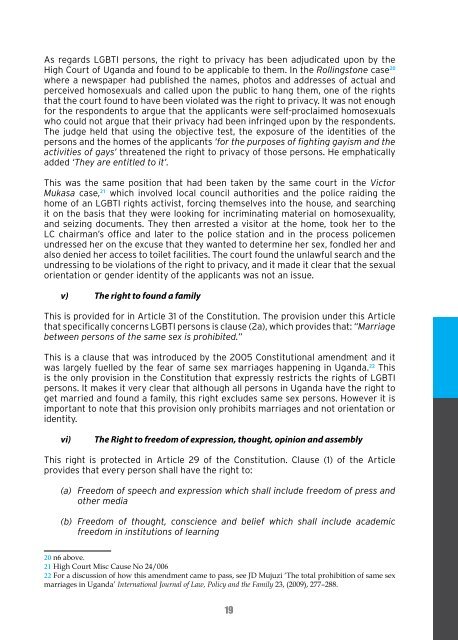PERSONS IN UGANDA
4Tks5WfQb
4Tks5WfQb
You also want an ePaper? Increase the reach of your titles
YUMPU automatically turns print PDFs into web optimized ePapers that Google loves.
As regards LGBTI persons, the right to privacy has been adjudicated upon by the<br />
High Court of Uganda and found to be applicable to them. In the Rollingstone case 20<br />
where a newspaper had published the names, photos and addresses of actual and<br />
perceived homosexuals and called upon the public to hang them, one of the rights<br />
that the court found to have been violated was the right to privacy. It was not enough<br />
for the respondents to argue that the applicants were self-proclaimed homosexuals<br />
who could not argue that their privacy had been infringed upon by the respondents.<br />
The judge held that using the objective test, the exposure of the identities of the<br />
persons and the homes of the applicants ‘for the purposes of fighting gayism and the<br />
activities of gays’ threatened the right to privacy of those persons. He emphatically<br />
added ‘They are entitled to it’.<br />
This was the same position that had been taken by the same court in the Victor<br />
Mukasa case, 21 which involved local council authorities and the police raiding the<br />
home of an LGBTI rights activist, forcing themselves into the house, and searching<br />
it on the basis that they were looking for incriminating material on homosexuality,<br />
and seizing documents. They then arrested a visitor at the home, took her to the<br />
LC chairman’s office and later to the police station and in the process policemen<br />
undressed her on the excuse that they wanted to determine her sex, fondled her and<br />
also denied her access to toilet facilities. The court found the unlawful search and the<br />
undressing to be violations of the right to privacy, and it made it clear that the sexual<br />
orientation or gender identity of the applicants was not an issue.<br />
v) The right to found a family<br />
This is provided for in Article 31 of the Constitution. The provision under this Article<br />
that specifically concerns LGBTI persons is clause (2a), which provides that: “Marriage<br />
between persons of the same sex is prohibited.”<br />
This is a clause that was introduced by the 2005 Constitutional amendment and it<br />
was largely fuelled by the fear of same sex marriages happening in Uganda. 22 This<br />
is the only provision in the Constitution that expressly restricts the rights of LGBTI<br />
persons. It makes it very clear that although all persons in Uganda have the right to<br />
get married and found a family, this right excludes same sex persons. However it is<br />
important to note that this provision only prohibits marriages and not orientation or<br />
identity.<br />
vi)<br />
The Right to freedom of expression, thought, opinion and assembly<br />
This right is protected in Article 29 of the Constitution. Clause (1) of the Article<br />
provides that every person shall have the right to:<br />
(a) Freedom of speech and expression which shall include freedom of press and<br />
other media<br />
(b) Freedom of thought, conscience and belief which shall include academic<br />
freedom in institutions of learning<br />
20 n6 above.<br />
21 High Court Misc Cause No 24/006<br />
22 For a discussion of how this amendment came to pass, see JD Mujuzi ‘The total prohibition of same sex<br />
marriages in Uganda’ International Journal of Law, Policy and the Family 23, (2009), 277–288.<br />
19


